新视野大学英语读写教程二-Unit-1-课件
- 格式:ppt
- 大小:695.00 KB
- 文档页数:19
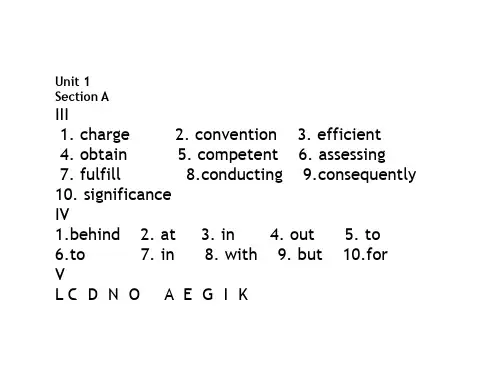
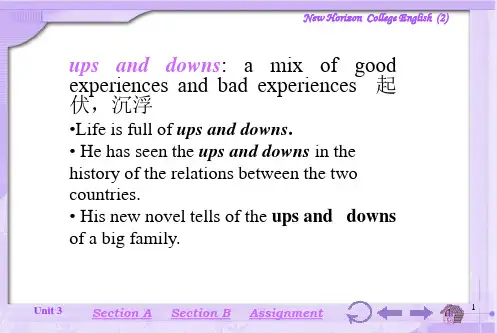
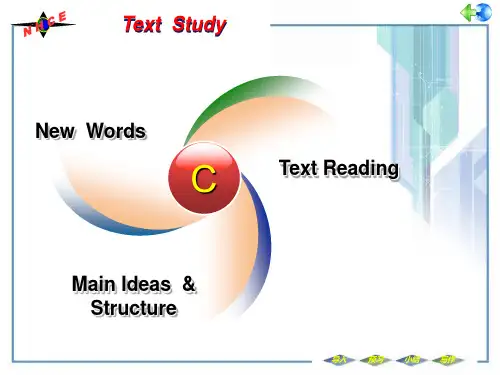
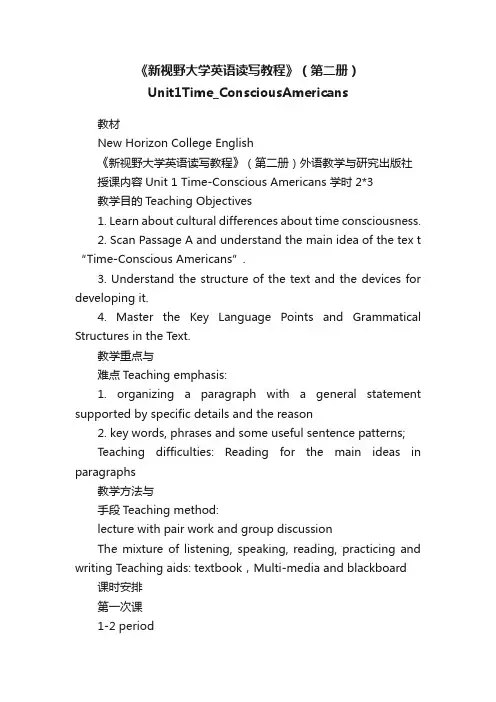
《新视野大学英语读写教程》(第二册)Unit1Time_ConsciousAmericans教材New Horizon College English《新视野大学英语读写教程》(第二册)外语教学与研究出版社授课内容Unit 1 Time-Conscious Americans 学时2*3教学目的Teaching Objectives1. Learn about cultural differences about time consciousness.2. Scan Passage A and understand the main idea of the tex t “Time-Conscious Americans”.3. Understand the structure of the text and the devices for developing it.4. Master the Key Language Points and Grammatical Structures in the T ext.教学重点与难点Teaching emphasis:1. organizing a paragraph with a general statement supported by specific details and the reason2. key words, phrases and some useful sentence patterns;Teaching difficulties: Reading for the main ideas in paragraphs教学方法与手段Teaching method:lecture with pair work and group discussionThe mixture of listening, speaking, reading, practicing and writing Teaching aids: textbook,Multi-media and blackboard 课时安排第一次课1-2 periodⅠWarm-up Activity1.Group work 15m2.Questions for thought and discussion 15mⅡBackground Information 10mⅢ listening 25mⅣ watch and Answer 25m第二次课3-4 periodⅤText Analysis·Global Reading 25m1. Main idea2. Text structure·Detailed Reading 65mWordsPhrasesLanguage points第三次课5-6 periodLanguage points 15mⅥText Summary 5mⅦWriting 25mⅧExercise Explanation 45m教学要点Teaching Points:1. Let the Ss know the learning objectives of this unit;2. Help the Ss understand the text as a whole and know some background knowledge;3. Have the Ss know some ideas of fame;4. Guide the Ss use freely the active expressions, key grammatical points and sentence patterns in this text.作业布置与思考Assignments:1. Vocabulary: Students are asked to master the key words and phrases.2. Sentence Structure: Teacher summaries the usage of “either…or” and “where” and Studentspractice rewriting sentences after the models.3. Translation教学参考书和网络资源Reference Books and Resources:1. Teacher’s Book of New Horizon College English2. Longman Dictionary of Contemporary English (English-Chinese)3. Oxford Advanced Learner’s English-Chinese Dictionary4. Longman Dictionary of American English5. On-line resources: English on line教学过程1-2 PeriodⅠWarm-up Activity (提问板书)1. Group work:1) Find out idioms Chinese have about time.Time is money.(时间就是金钱或一寸光阴一寸金)Time and tide wait for no man.(岁月不待人)Never put off till tomorrow what may be done today.(今日事,今日毕)2) Find out major differences of time between Chinese and English culture.Chinese Culture:a)masses (collectivism).b)human and 'heaven' as one (天人和一).c)ethics and tolerance (中恕之道).d)internal cultivation (修身养性).Western culture:a)Individualism.b)adventurous and exploration based.c)based on scienced)law to resolve people and people's relationship.e)'god' and religion to resolve human and spiritualism relationship.2. Questions for thought and discussion:(提问课本)1)What precious resources do Americans value and save?2)What are the three kinds of behavior that Americans consider to be a waste of time?3)In what different ways do Americans approach time in business relations?Ⅱ Background Information: (讲解课件)1. Cultural Conflicts:Each nation has its own conventions. Different nations have different cultures. When two cultures clash, problems in communication may occur. Which side should compromise when there are cultural conflicts? In fact, knowing and understanding the other's culture is the responsibility of both sides, and both sides should be willing to compromise. Educating, rather than complaining and blaming, is the best solution to cultural conflicts.2. Hourglass:A glass container holding fine sand for measuring time, which is narrow in themiddle like a figure 8 so that the sand inside can run slowly from the top half to the bottom taking exactly one hour.。
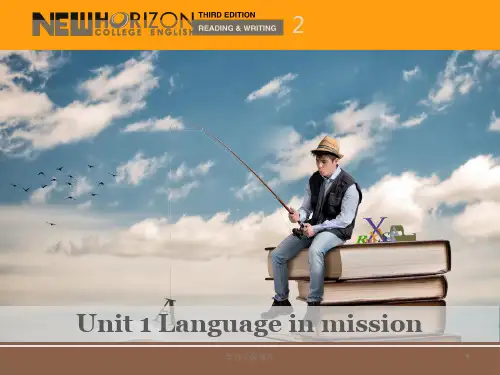

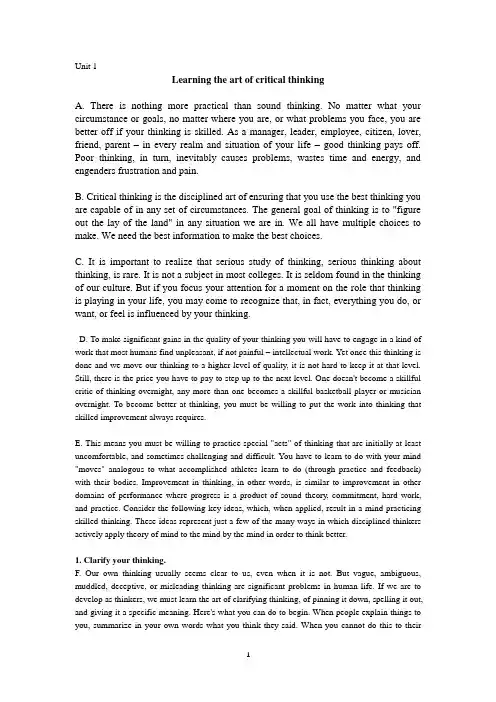
Unit 1Learning the art of critical thinkingA. There is nothing more practical than sound thinking. No matter what your circumstance or goals, no matter where you are, or what problems you face, you are better off if your thinking is skilled. As a manager, leader, employee, citizen, lover, friend, parent –in every realm and situation of your life –good thinking pays off. Poor thinking, in turn, inevitably causes problems, wastes time and energy, and engenders frustration and pain.B. Critical thinking is the disciplined art of ensuring that you use the best thinking you are capable of in any set of circumstances. The general goal of thinking is to "figure out the lay of the land" in any situation we are in. We all have multiple choices to make. We need the best information to make the best choices.C. It is important to realize that serious study of thinking, serious thinking about thinking, is rare. It is not a subject in most colleges. It is seldom found in the thinking of our culture. But if you focus your attention for a moment on the role that thinking is playing in your life, you may come to recognize that, in fact, everything you do, or want, or feel is influenced by your thinking.D. To make significant gains in the quality of your thinking you will have to engage in a kind of work that most humans find unpleasant, if not painful – intellectual work. Yet once this thinking is done and we move our thinking to a higher level of quality, it is not hard to keep it at that level. Still, there is the price you have to pay to step up to the next level. One doesn't become a skillful critic of thinking overnight, any more than one becomes a skillful basketball player or musician overnight. To become better at thinking, you must be willing to put the work into thinking that skilled improvement always requires.E. This means you must be willing to practice special "acts" of thinking that are initially at least uncomfortable, and sometimes challenging and difficult. You have to learn to do with your mind "moves" analogous to what accomplished athletes learn to do (through practice and feedback) with their bodies. Improvement in thinking, in other words, is similar to improvement in other domains of performance where progress is a product of sound theory, commitment, hard work, and practice. Consider the following key ideas, which, when applied, result in a mind practicing skilled thinking. These ideas represent just a few of the many ways in which disciplined thinkers actively apply theory of mind to the mind by the mind in order to think better.1. Clarify your thinking.F. Our own thinking usually seems clear to us, even when it is not. But vague, ambiguous, muddled, deceptive, or misleading thinking are significant problems in human life. If we are to develop as thinkers, we must learn the art of clarifying thinking, of pinning it down, spelling it out, and giving it a specific meaning. Here's what you can do to begin. When people explain things to you, summarize in your own words what you think they said. When you cannot do this to theirsatisfaction, you don't really understand what they said. When they cannot summarize what you have said to your satisfaction, they don't really understand what you said. Try it. See what happens.2. Stick to the point.G. Be on the lookout for fragmented thinking, thinking that leaps about with no logical connections. Start noticing when you or others fail to stay focused on what is relevant. Focus on finding what will aid you in truly solving a problem. When someone brings up a point (however true) that doesn't seem pertinent to the issue at hand, ask, "How is what you are saying relevant to the issue?" When you are working through a problem, make sure you stay focused on what sheds light on and, thus, helps address the problem. Don't allow your mind to wander to unrelated matters. Don't allow others to stray from the main issue. Frequently ask: "What is the central question? Is this or that relevant to it? How?"3. Question questions.H. Most people are not skilled questioners. Most accept the world as it is presented to them. And when they do question, their questions are often superficial or "loaded". Their questions do not help them solve their problems or make better decisions. Good thinkers routinely ask questions in order to understand and effectively deal with the world around them. They question the status quo. They know that things are often different from the way they are presented. Their questions penetrate images, masks, fronts, and propaganda. Their questions make real problems explicit and discipline their thinking through those problems. If you become a student of questions, you can learn to ask powerful questions that lead to a deeper and more fulfilling life. Your questions become more basic, essential, and deep.4. Be reasonable.I. One of the hallmarks of a critical thinker is the disposition to change one's mind when given good reason to change. Good thinkers want to change their thinking when they discover better thinking. They can be moved by reason. Yet, comparatively few people are reasonable. Few are willing to change their minds once set. Few are willing to suspend their beliefs to fully hear the views of those with which they disagree. How would you rate yourself?J. The extent to which any of us develops as a thinker is directly determined by the amount of time we dedicate to our development, the quality of the intellectual practice we engage in, and the depth, or the lack thereof, of our commitment to becoming more reasonable, rational, successful persons.1. Critical thinking is a kind of art that can be trained to guarantee that you use the2. If other people are not satisfied with your summary of what they said, it means you have problems understanding what they said.4. You may find that your thinking influences whatever you do, or want, or feel, if5. Most people are unwilling to suspend their beliefs and seriously listen to others'6. Intellectual work, though unpleasant for most people, can help us make great8. In order to avoid thinking fragmentedly, you need to concentrate on finding the key9. Critical thinkers will change their minds when there are good reasons to do so,10. The process of learning to train your mind is similar to the process of athletes learning to train their bodies.1-5:BFACI6-10:DHGIE。
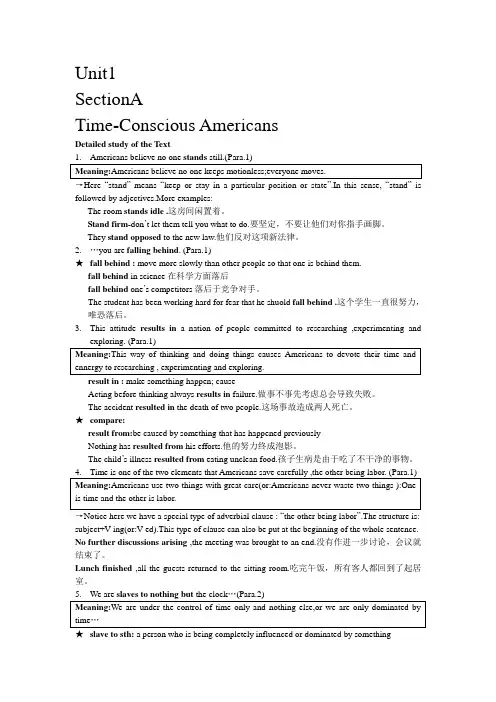
Unit1SectionATime-Conscious AmericansDetailed study of the T extfollowed by adjectives.More examples:The room stands idle .这房间闲置着。
Stand firm-don’t let them tell you what to do.要坚定,不要让他们对你指手画脚。
They stand opposed to the new law.他们反对这项新法律。
2.…you are falling behind. (Para.1)★fall behind : move more slowly than other people so that one is behind them.fall behind in science在科学方面落后fall behind one’s competitors落后于竞争对手。
The student has been working hard for fear that he shuold fall behind .这个学生一直很努力,唯恐落后。
3.This attitude results in a nation of people committed to researching ,experimenting andresult in : make something happen; causeActing before thinking always results in failure.做事不事先考虑总会导致失败。
The accident resulted in the death of two people.这场事故造成两人死亡。
★compare:result from:be caused by something that has happened previouslyNothing has resulted from his efforts.他的努力终成泡影。
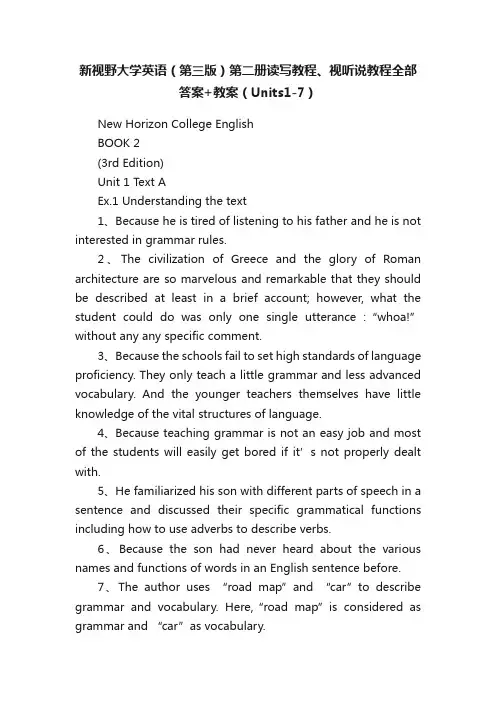
新视野大学英语(第三版)第二册读写教程、视听说教程全部答案+教案(Units1-7)New Horizon College EnglishBOOK 2(3rd Edition)Unit 1 Text AEx.1 Understanding the text1、Because he is tired of listening to his father and he is not interested in grammar rules.2、The civilization of Greece and the glory of Roman architecture are so marvelous and remarkable that they should be described at least in a brief account; however, what the student could do was only one single ut terance :“whoa!” without any any specific comment.3、Because the schools fail to set high standards of language proficiency. They only teach a little grammar and less advanced vocabulary. And the younger teachers themselves have little knowledge of the vital structures of language.4、Because teaching grammar is not an easy job and most of the students will easily get bored if it’s not properly dealt with.5、He familiarized his son with different parts of speech in a sentence and discussed their specific grammatical functions including how to use adverbs to describe verbs.6、Because the son had never heard about the various names and functions of words in an English sentence before.7、The author uses “road map”and “car”to describe grammar and vocabulary. Here,“road map”is considered as grammar and “car”as vocabulary.8、Since the subjunctive mood his son used is a fairly advanced grammar structure, the interjection“whoa!”reflects the tremendous pride the father had toward his son; it also reflects the author’s humor in using the word because it was once used by his student, though in two different situations and with two different feelings.Ex.3 Words in use1.condense2.exceed3.deficit4.exposure5.asset6.adequate/doc/694713736.html,petent8.adjusting9.precisely 10.beneficialEx.4 Word building-al/-ial:managerial/editorial/substance/survival/tradition/margin -cy : consistency/accuracy/efficient-y : recovery/ministry/assemblyEx.5 Word building1.editorial2.recovery3.accuracy4.substance5.managerial6.margin7.assembly8.Ministry9.survival 10.tradition 11.consistency 12.efficientEx.6 Banked cloze1-5: L C J A I 6-10: O N E H FEx.7 Expressions in use1.feel obliged to2.be serious about3.run into4.distinguish between5.thrust upon6.was allergic to7.get lost8.be attracted to9.make sense 10.looked upon asEx.8 Structured writingSome bookworms in my dormitory often spend hours reading their “Bible”, Practical English Grammar, and do a lot of exercises in that book , but I don’t ca re about it at all. My assumption is since I have never learned Chinese grammar, what’s the sense of learning English grammar? In fact, English grammar has always been a big headache to me.English grammar is very complicated because, unlike Chinese, there are many verb tenses. Even stranger than verb tenses, English grammar also contains something very confusing. For example, I don’t remember how many times my middle school teacher tried to“impose”the differences between used to and be used to on us. Sometimes he would go on with the explanation for 20 minutes or so. He even summarized the differences by listing three or four points for us to memorize. However, they could never stay in my head . I don’t remember how many times I got it wrong with the sentences containingused to or be used to on my exams . I was really confused with these two phrases,and I can never get them right.In brief, I’m allergic to learning English grammar. Curiously, I just wonder if the native speakers of English have a microcomputer in their brain to help them utter the two phrases promptly with just a click of their brain mouse!Ex.9 E-C Translation人们普遍认为英语是一种世界语言,经常被许多不以英语为第一语言的国家使用。
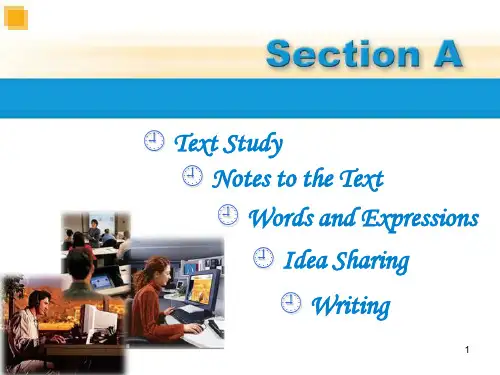
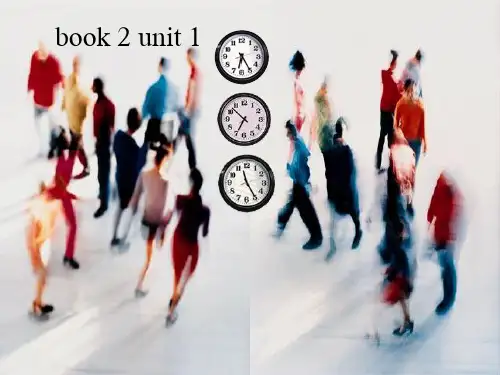
Unit 1 Text A An Impressive English Lesson一堂难忘的英语课Pre-reading script:I’m Michal. I live in Poland, and Polish is my native language. I started learning English by listening to the Beatles every day. At the beginning, I didn’t know what they were signing, but soon I started to understand individual words, and later, more. Each time I hear a Beatles’ song, I am delighted and feel proud because I can understand a lot better, I listen to many rock bands, all in English, and I really enjoy them. Besides listening to English songs, I also started reading science fiction books in English. I still remember how excited I was when I successfully finished reading the first English book, a great breakthrough in my life! When I read in English, I not only have the pleasure of reading but also get the feeling of self-accomplishment. English has given me so much satisfaction and pleasure. I feel I'm free!1 Listen to a talk about an English learner's learning experience and fill in the blank in each sentence based on what you hear.1. Michal started learning English by listening to the Beatles.2. Michal feels delighted and proud when he listens to the Beatles because he can understand a lot better.3. Besides listening to English songs, Michal also reads science fiction books in English.4. Michal made a great breakthrough in learning the English language after successfully finishing reading the first English book.5. According to Michal, English learning brings him satisfaction and pleasure.2 Listen to the talk again and answer the following questions.1.Yes, because the way to learn English is more interesting and enjoyable.Yes, because learners become more motivated when learning something they like.No, because it's like a street learning without formal instruction.No, because learners may often make grammatical mistakes when talking or sp2.Yes, I could speak and write more fluently with good grammar and vocabulary.Yes,I could better understand English native speakers after watching English movies and talk shows.Yes, as a result of surfing online in English, I'm able to read more quickly than before.3.Read English novels and magazines.Listen to radios and watch TV program.Talk to English speaks whenever possibleWrite every day such as emails and journals课文导读(一)内容介绍对于我的儿子而言,我是一个沉湎于语法规则的人,对此我儿子似乎颇为反感。